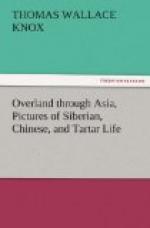The wealth of Krasnoyarsk is chiefly derived from gold digging. The city may be considered the center of mining enterprises in the government of Yeneseisk. Two or three thousand laborers in the gold mines spend the winter at Krasnoyarsk, and add to the volume of local commerce. The town of Yeneseisk, three hundred versts further north, hibernates an equal number, and many hundreds are scattered through the villages in the vicinity. The mining season begins in May and ends in September. In March and April the clerks and superintendents engage their laborers, paying a part of their wages in advance. The wages are not high, and only those in straitened circumstances, the dissolute, and profligate, who have no homes of their own, are inclined to let themselves to labor in gold mines.
Many works are extensive, and employ a thousand or more laborers each. The government grants mining privileges to individuals on certain conditions. The land granted must be worked at least one year out of every three, else the title reverts to the government, and can be allotted again. The grantee must be either a hereditary nobleman or pay the tax of a merchant of the second guild, or he should be able to command the necessary capital for the enterprise he undertakes. His title holds good until his claim is worked out or abandoned, and no one can disturb him on any pretext. He receives a patent for a strip of land seven versts long and a hundred fathoms wide, on the banks of a stream suitable for mining purposes. The claim extends on both sides of the stream, and includes its bed, so that the water may be utilized at the will of the miner.
Sometimes the grantee desires a width of more than a hundred fathoms, but in such case the length of his claim is shortened in proportion.
It requires a large capital to open a claim after the grant is obtained. The location is often far from any city or large town, where supplies are purchased. Transportation is a heavy item, as the roads are difficult to travel. Sometimes a hundred thousand roubles will be expended in supplies, transportation, buildings, and machinery, before the work begins. Then men must be hired, taken to the mines, clothed, and furnished with, proper quarters. The proprietor must have at hand a sufficient amount of provisions, medical stores, clothing, and miscellaneous goods to supply his men during the summer. Everything desired by the laborer is sold to him at a lower price than he could buy elsewhere, at least such is the theory. I was told that the mining proprietors make no profits from their workmen, but simply add the cost of transportation to the wholesale price of the merchandise. The men are allowed to anticipate their wages by purchase, and it often happens that there is very little due them at the end of the season.




